Llamaslikesciencetoo - This Is My Side Blog About Science

More Posts from Llamaslikesciencetoo and Others


Ancient ‘otter bear’ may have popped clams off rocks like a bottle opener
By Sid Perkins
A creature that roamed the coasts of the Pacific Northwest about 20 million years ago may have had a feeding style like no other mammal, a new study suggests.
Kolponomos is known only from two bearlike skulls, jawbones, and some toe bones found a few decades ago, so scientists aren’t sure where it fits on the carnivore family tree or even what it really looked like (one artist’s idea is seen above).
Rather than having cheek teeth that could shear meat, as many carnivores do, Kolponomos’s molars were similar to the flattened, low-crowned teeth that otters use to crush their shelled prey—yet the creature lived long before anything similar to modern-day otters evolved.
Now, a new analysis using the same sort of computer software that engineers employ to analyze bridges and aircraft parts suggests that Kolponomos may have collected its shelly prey in a unique way…
(read more: Science Magazine/AAAS)
illustration by Roman Uchytel

Come and take a “bite” out of nature & science, attending Explorers Society Members Event. #northmuseum #stemsisters #sharks (at North Museum of Nature & Science)
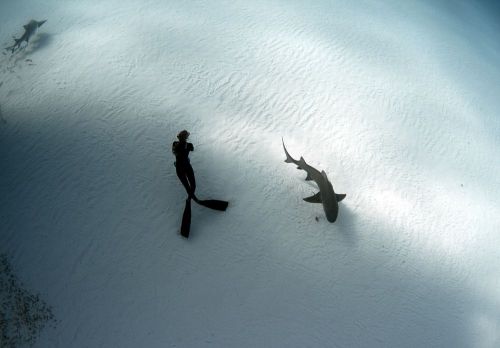
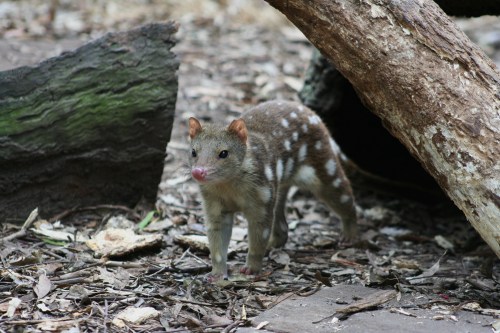
Quoll Returns to the Australian Mainland After 50 Years
On March 1st, Fourteen eastern quolls were released into Australia’s mainland to rebuild their population because of a team’s effort from Australian National University. Since the 1770′s, quoll numbers have been declining due to many dangers such as habitat loss and predators that include foxes, wild dogs, and cats.
The quoll is carnivorous and feeds on smaller mammals, small birds, lizards, and insects. Until now, it has inhabited inland parts of Australia. There are six current species(pictured is the tiger quoll). The larger of which live longer than the smaller, with an average life span of two to five years.
So, whats the point of this translocation? Well, quolls are important to the functioning of the mainland ecosystem where they regulate the prey species. The released quolls will have radio tracking collars to be monitored.
Fact about the quoll: Male and female quolls only meet for mating, and male den territories often overlap female territories. However, they have communal toilets where they may have up to 100 droppings in them.
Photo by: joshua cunningham via Flickr

A Deep Sea Squid Cares for Her Eggs
In recent years, submersibles have allowed scientists to explore the lives of deep-sea animals in ways that were not possible before. One of the many exciting discoveries was that a mother of the deep-sea squid species Gonatus onyx broods her eggs by holding them in her arms, a behavior that had never been previously reported for squids.
This shocking discovery was the first time scientists had evidence of parental care in squids. In 2012, a team of researchers led by Stephanie Bush, reported finding another species of deep-sea squid that broods eggs, Bathyteuthis berryi, suggesting that this form of parental care may be a common solution to a reproductive problem for deep-sea squids.
Watch a video about this amazing deep-sea discovery:
http://ow.ly/ZS9jc
(via: Monterey Bay Aquarium Research Institute)


This picture looks just like another dead fish washed up on shore - until you realize that it’s actually a whale, and those are grizzly bears standing on it.
(Source)

New Species of Shieldtail Snake Discovered in India
by Enrico de Lazaro
The Khaire’s black shieldtail (Melanophidium khairei) is described in a paper recently published in the journal Zootaxa by an international team of scientists led by Dr. David Gower of the Natural History Museum, London, UK. The newfound species occurs in southern Maharashtra, Goa, and northern Karnataka. It is the most northerly member of the genus…
(read more: Science News)
photographvia: David J. Gauer et al.


Microbiolgy & Virology flash cards i made today.
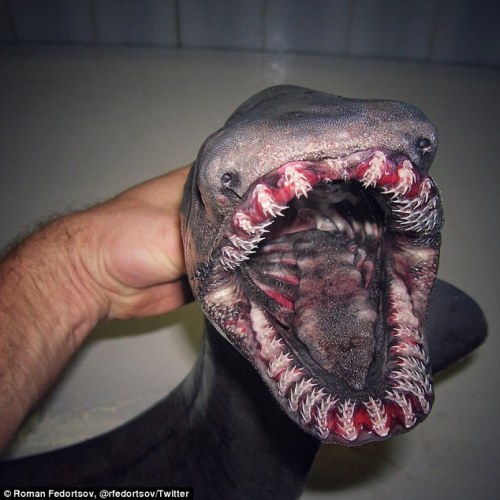
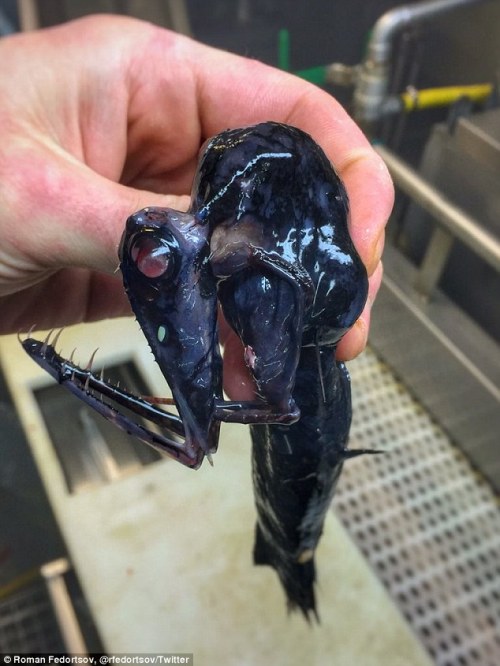
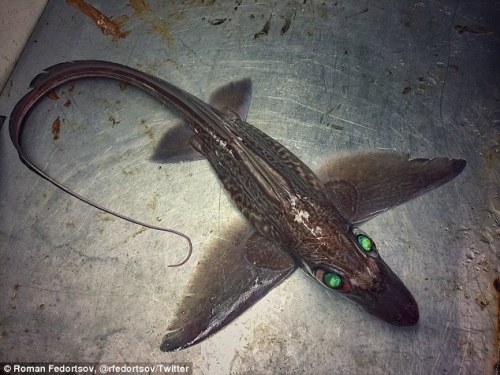
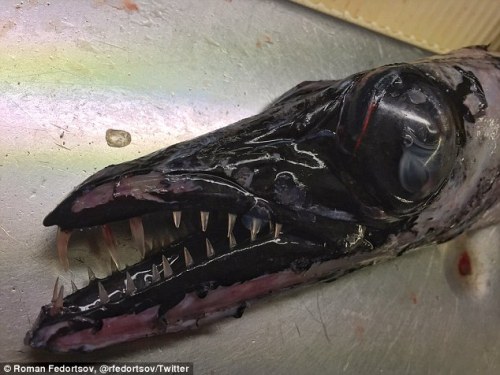
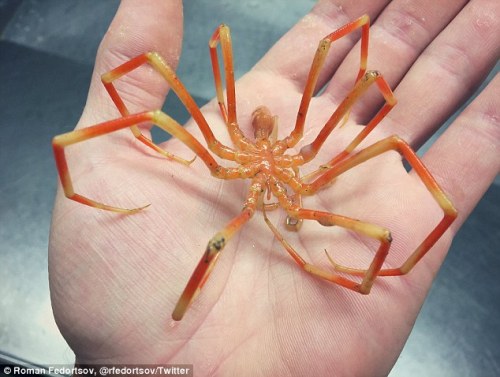
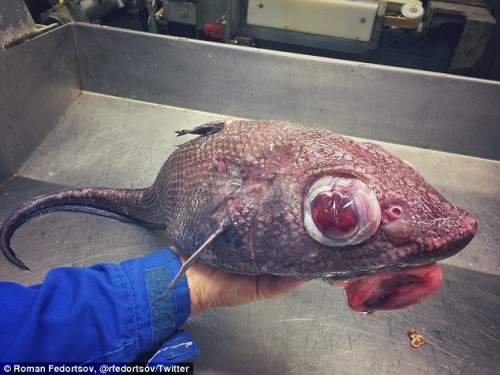
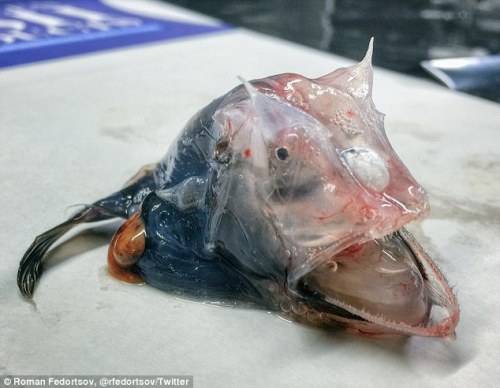
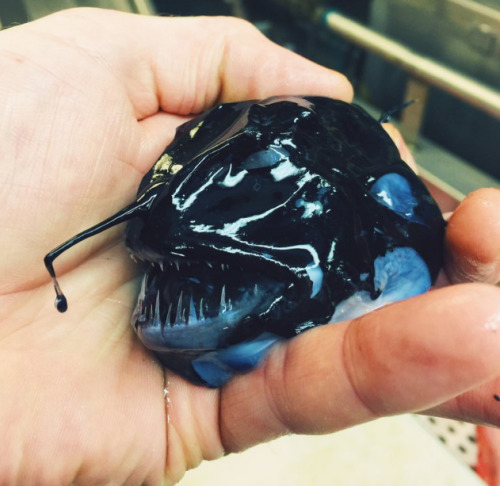
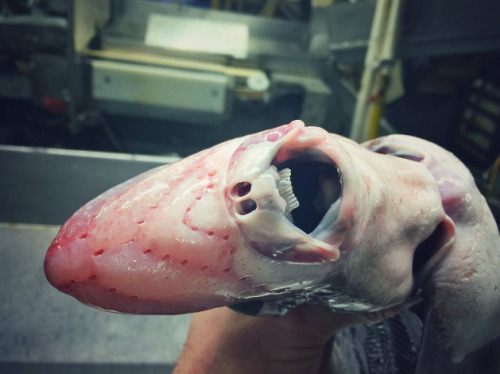
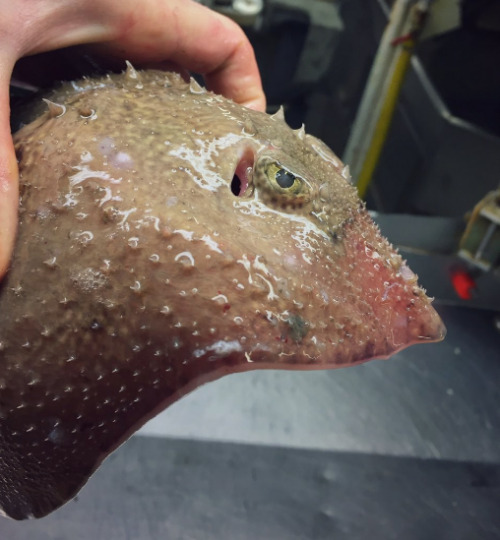
Russian deep sea fisherman becomes online hit after revealing bizarre catches
1. Frilled Shark 2. Unidentified, possibly a stoplight loosejaw, a deep-sea dragonfish from the genus Malacosteus 3. Ghost Shark 4. Black Scabbardfish 5. Sea Spider 6. Grenadier or Rattail Fish 7. Unidentified 8. Anglerfish, species unidentified 9. Unidentified 10. Ray, species unidentified
-
 yeaaaahbaby liked this · 7 years ago
yeaaaahbaby liked this · 7 years ago -
 weightin4theend reblogged this · 7 years ago
weightin4theend reblogged this · 7 years ago -
 seguindoopontilhado liked this · 8 years ago
seguindoopontilhado liked this · 8 years ago -
 littleblueralts liked this · 8 years ago
littleblueralts liked this · 8 years ago -
 lust-for-lux liked this · 8 years ago
lust-for-lux liked this · 8 years ago -
 stopmototiontk421 liked this · 8 years ago
stopmototiontk421 liked this · 8 years ago -
 sharkbait-007-blog reblogged this · 8 years ago
sharkbait-007-blog reblogged this · 8 years ago -
 nordrike liked this · 8 years ago
nordrike liked this · 8 years ago -
 audhd-dragonaut reblogged this · 8 years ago
audhd-dragonaut reblogged this · 8 years ago -
 browncoul123 reblogged this · 8 years ago
browncoul123 reblogged this · 8 years ago -
 aintmykindahype liked this · 9 years ago
aintmykindahype liked this · 9 years ago -
 keep-dreaming-fairy-tales liked this · 9 years ago
keep-dreaming-fairy-tales liked this · 9 years ago -
 mama-miaa liked this · 9 years ago
mama-miaa liked this · 9 years ago -
 vivensxfortitudo liked this · 9 years ago
vivensxfortitudo liked this · 9 years ago -
 never-escape-fr0m-th3-darkness reblogged this · 9 years ago
never-escape-fr0m-th3-darkness reblogged this · 9 years ago -
 never-escape-fr0m-th3-darkness liked this · 9 years ago
never-escape-fr0m-th3-darkness liked this · 9 years ago -
 caspercinho liked this · 9 years ago
caspercinho liked this · 9 years ago -
 cutesiewooren reblogged this · 9 years ago
cutesiewooren reblogged this · 9 years ago -
 cutesiewooren liked this · 9 years ago
cutesiewooren liked this · 9 years ago -
 p-3ach3s reblogged this · 9 years ago
p-3ach3s reblogged this · 9 years ago -
 fleshcape reblogged this · 9 years ago
fleshcape reblogged this · 9 years ago -
 gldskies reblogged this · 9 years ago
gldskies reblogged this · 9 years ago -
 heyameliaheyy liked this · 9 years ago
heyameliaheyy liked this · 9 years ago -
 eating-the-brains-of-cinema liked this · 9 years ago
eating-the-brains-of-cinema liked this · 9 years ago -
 protectoceanlife reblogged this · 9 years ago
protectoceanlife reblogged this · 9 years ago -
 whats-up-beaches reblogged this · 9 years ago
whats-up-beaches reblogged this · 9 years ago -
 solitude-babe-blog reblogged this · 9 years ago
solitude-babe-blog reblogged this · 9 years ago -
 shubmissive liked this · 9 years ago
shubmissive liked this · 9 years ago -
 deadblog17 reblogged this · 9 years ago
deadblog17 reblogged this · 9 years ago -
 yowhatsgoodbruh reblogged this · 9 years ago
yowhatsgoodbruh reblogged this · 9 years ago -
 allostas reblogged this · 9 years ago
allostas reblogged this · 9 years ago -
 hetalia-futurediary-blog liked this · 9 years ago
hetalia-futurediary-blog liked this · 9 years ago -
 beatblaster4-blog reblogged this · 9 years ago
beatblaster4-blog reblogged this · 9 years ago -
 beatblaster4-blog liked this · 9 years ago
beatblaster4-blog liked this · 9 years ago -
 les-lunettes-du-lion reblogged this · 9 years ago
les-lunettes-du-lion reblogged this · 9 years ago -
 axevok reblogged this · 9 years ago
axevok reblogged this · 9 years ago
Mainly interested in ecology, but also the entirety of science.
179 posts